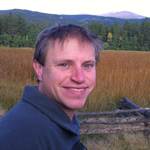about
our people

Steven Loheide
Associate Professor
Civil and Environmental Engineering, Geological Engineering, and Freshwater and Marine Sciences
research areas: Groundwater and Agriculture

Loheide’s research focuses on the interactions between ecological and hydrological processes in natural and built systems. His approaches use a combination of field data, remote sensing, and numerical modeling to understand the feedbacks between vegetation patterning, vegetative water use, soil moisture availability, groundwater regimes, and stream-aquifer interactions. This work is focused on improving the scientific basis for stream, floodplain, and wetland restoration efforts under current and future climatic conditions.
Loheide received a B.S. in Geology and Environmental Chemistry from the University of Northern Iowa (1999); an M.S. in Geology from Indiana University (2001), and a Ph.D. in Hydrogeology from Stanford University (2006).


